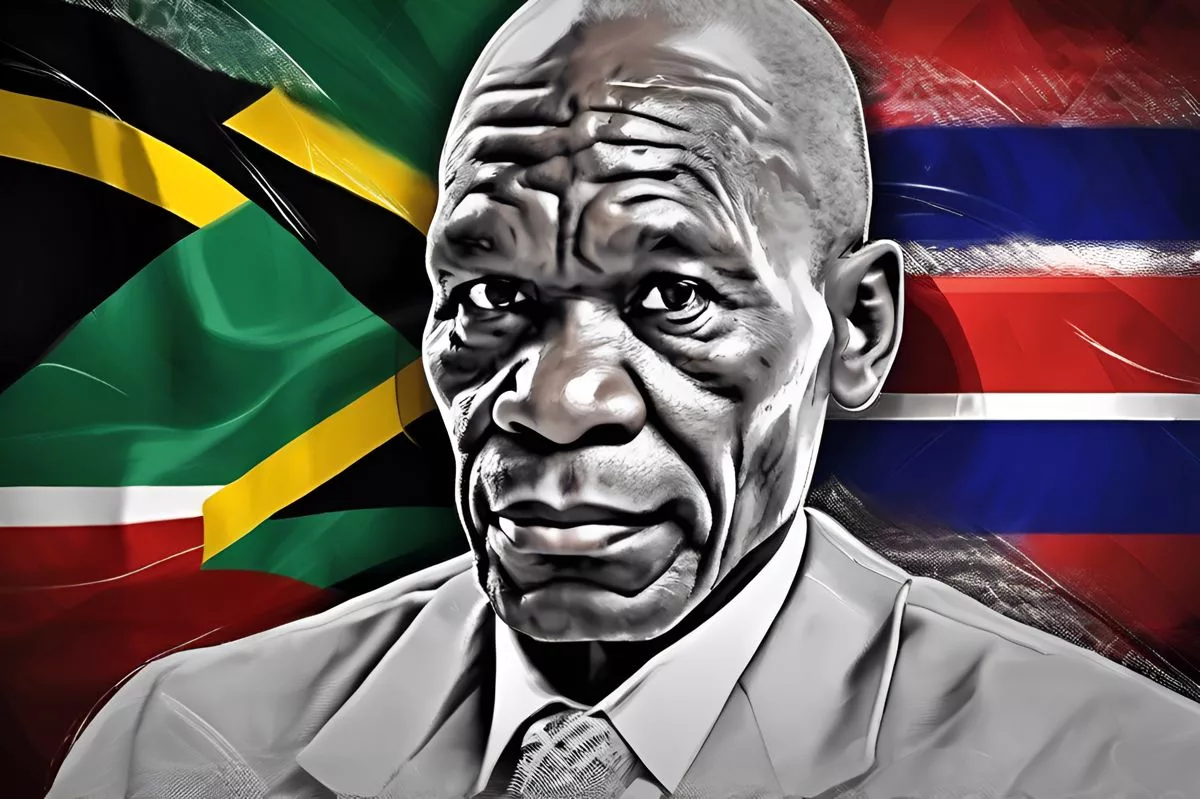Justice Yvonne Mokgoro was an iconic figure in South African law, known for her dedication to justice and the rule of law. As the first black woman to serve on the Constitutional Court Bench, she shattered barriers and set precedents. Her contributions extended beyond her appointment, as she was also an accomplished judge, activist, scholar, and advocate for social unity. Mokgoro’s legacy continues to inspire future generations, as she was a true icon of justice who deeply understood the philosophy of ubuntu and left an indelible mark on South African society.
Who is Justice Yvonne Mokgoro?
Justice Yvonne Mokgoro was an iconic figure in South African jurisprudence, known for her unwavering dedication to justice and the rule of law. As the first black woman to serve on the Constitutional Court Bench, Mokgoro shattered longstanding barriers and set precedents. Her contributions extended beyond her groundbreaking appointment, as she was also an accomplished judge, activist, scholar, and advocate for social unity. Mokgoro’s legacy continues to inspire and guide future generations.
A True Icon of Justice
Renowned for her unwavering dedication to justice and the rule of law, Yvonne Mokgoro is regarded as a standout figure in the realm of South African jurisprudence. Her relentless pursuit of justice, locally and globally, has made her an emblem of hope and an exemplar of inspiration. The Special Ceremonial Court Sitting held on May 27, 2024, in Johannesburg’s Constitutional Court in her honor, was a testament to her extraordinary life. This event also reaffirmed her legacy’s profound and lasting impact.
Mokgoro’s life is a testament to ubuntu, a Bantu philosophy that advocates for common humanity. Her life journey is riddled with remarkable milestones and an unwavering commitment to improving the lives of her countrymen. As the first black woman to serve the Constitutional Court Bench, she set precedents, charted new paths, and shattered longstanding, untouched barriers.
Her contributions extend beyond her groundbreaking appointment. Mokgoro was a woman of many talents – an accomplished judge, a zealous activist, a respected scholar, an advocate for social unity, and an extraordinary individual. Justice Albie Sachs, her colleague, once aptly referred to her as “ubuntu personified in court and in action.”
Ubuntu: More than a Philosophy
Mokgoro’s unique understanding of ubuntu deeply resonates with her African heritage and her identity as an African woman. To her, ubuntu was not merely a broad, universal ideology. Instead, it was a concept deeply ingrained in her heritage. This philosophy was not just a theoretical concept for Mokgoro. Rather, it became a lived experience, evident in her verdicts, her advocation for a more restorative justice system, and her emphasis on the law’s reconciliation aspect.
Born and raised in Kimberley, Mokgoro naturally gravitated towards roles that involved interaction with people. After completing her high school at St Boniface, she embarked on an education degree, intending to pursue teaching. Yet, a life-changing interaction with Robert Sobukwe, the Pan Africanist Congress leader, during a traumatic period in her life, led her to a different path. Sobukwe’s persuasion that no law prohibited women from being lawyers inspired her to switch her academic focus to law.
Pioneering the Path of Justice
Mokgoro’s ascent in the legal world was meteoric. Her academic milestones – a B Iuris, an LLB, and two LLM degrees – were stepping stones in her illustrious career. She followed a path marked by a relentless commitment to human rights, the Constitution, and the rule of law.
Mokgoro’s appointment as the first black woman to the Constitutional Court Bench was a landmark moment for South African democracy, underscoring the law’s transformative power. However, her journey did not come without its share of hurdles. Apartheid-era prejudice and discrimination persisted, threatening to eclipse her accomplishments. Nevertheless, she remained undaunted, using these adverse experiences to fuel her relentless pursuit of justice and equality.
Mokgoro’s influence extended beyond the courtroom. For sixteen years, she served as the chairperson of the South African Law Reform Commission, instilling a human rights-based approach into South African law. Her proactive efforts in legal reform, her staunch defense of vulnerable and oppressed groups, and her unwavering commitment to human rights have left an indelible mark on South African society.
A Legacy that Echoes
Mokgoro’s significant contributions resonated with not only the legal community but all societal sectors as well, as seen in the numerous tributes received from around the world. Her work with the Nelson Mandela Children’s Fund, her lectures at various universities, and her tenure on the University of Venda’s council and as chair of the UN Human Rights Council‘s Racial Justice Body, underscore her extensive and profound influence.
Maya Angelou’s quote, “People will forget what you said, people will forget what you did, but people will never forget how you made them feel,” beautifully summarizes the lasting impact of Justice Mokgoro. Through her words, deeds, and work, Mokgoro touched countless lives, making them feel valued and heard.
While the loss of Justice Mokgoro is deeply felt, her legacy will continue to inspire, guide, and galvanize future generations. As Deputy Minister of Justice and Constitutional Development, Hon JH Jeffery, MP, eloquently stated, “She will continue to inspire many. May she rest in peace.”
What is Justice Yvonne Mokgoro known for?
Justice Yvonne Mokgoro is known for her dedication to justice and the rule of law. She was the first black woman to serve on the Constitutional Court Bench, setting precedents and shattering barriers. Her contributions extended beyond her appointment, and she was also an accomplished judge, activist, scholar, and advocate for social unity. Mokgoro’s legacy continues to inspire future generations, as she was a true icon of justice who deeply understood the philosophy of ubuntu and left an indelible mark on South African society.
What is the philosophy of ubuntu?
Ubuntu is a Bantu philosophy that advocates for common humanity. Justice Mokgoro deeply understood and lived this philosophy, which was deeply ingrained in her heritage. To her, ubuntu was not merely a broad, universal ideology but a concept that became a lived experience, evident in her verdicts, her advocation for a more restorative justice system, and her emphasis on the law’s reconciliation aspect.
What were Justice Mokgoro’s accomplishments?
Justice Mokgoro’s ascent in the legal world was meteoric. Her academic milestones – a B Iuris, an LLB, and two LLM degrees – were stepping stones in her illustrious career. She followed a path marked by a relentless commitment to human rights, the Constitution, and the rule of law. Mokgoro’s appointment as the first black woman to the Constitutional Court Bench was a landmark moment for South African democracy, underscoring the law’s transformative power. Her influence extended beyond the courtroom, as she served as the chairperson of the South African Law Reform Commission for sixteen years, instilling a human rights-based approach into South African law.
How did Justice Mokgoro’s legacy impact South African society?
Justice Mokgoro’s significant contributions resonated with not only the legal community but all societal sectors as well, as seen in the numerous tributes received from around the world. Her work with the Nelson Mandela Children’s Fund, her lectures at various universities, and her tenure on the University of Venda’s council and as chair of the UN Human Rights Council’s Racial Justice Body underscored her extensive and profound influence. Her proactive efforts in legal reform, her staunch defense of vulnerable and oppressed groups, and her unwavering commitment to human rights have left an indelible mark on South African society.
What was the significance of Justice Mokgoro’s appointment to the Constitutional Court Bench?
Justice Mokgoro’s appointment as the first black woman to the Constitutional Court Bench was a landmark moment for South African democracy, underscoring the law’s transformative power. Her appointment shattered longstanding barriers and set precedents, charting new paths in South African law. Despite the apartheid-era prejudice and discrimination that persisted, Justice Mokgoro remained undaunted, using these adverse experiences to fuel her relentless pursuit of justice and equality.
How did Justice Mokgoro understand the philosophy of ubuntu?
Justice Mokgoro deeply understood the philosophy of ubuntu, which was not just a theoretical concept for her but a lived experience. Her understanding of ubuntu deeply resonated with her African heritage and her identity as an African woman. She saw ubuntu not merely as a broad, universal ideology but a concept that became a lived experience, evident in her verdicts, her advocation for a more restorative justice system, and her emphasis on the law’s reconciliation aspect.












